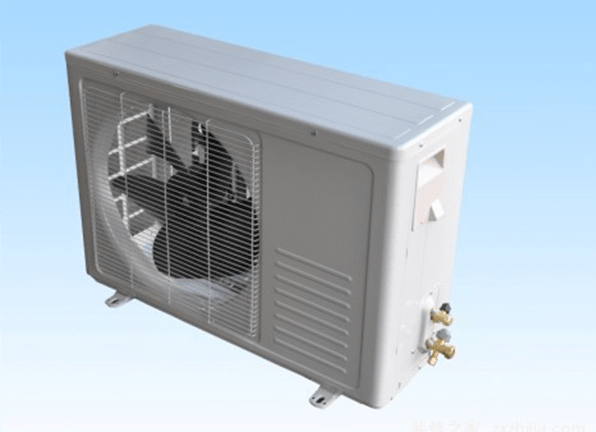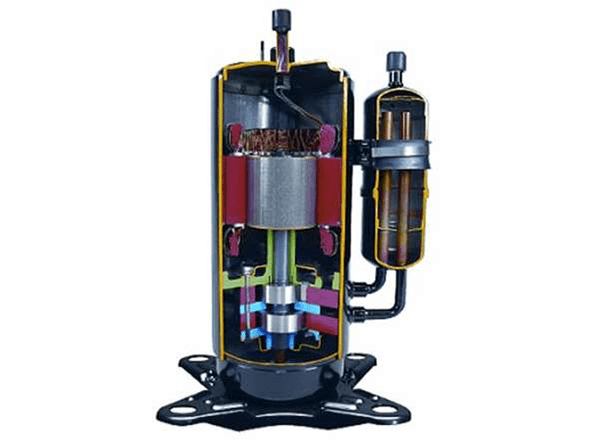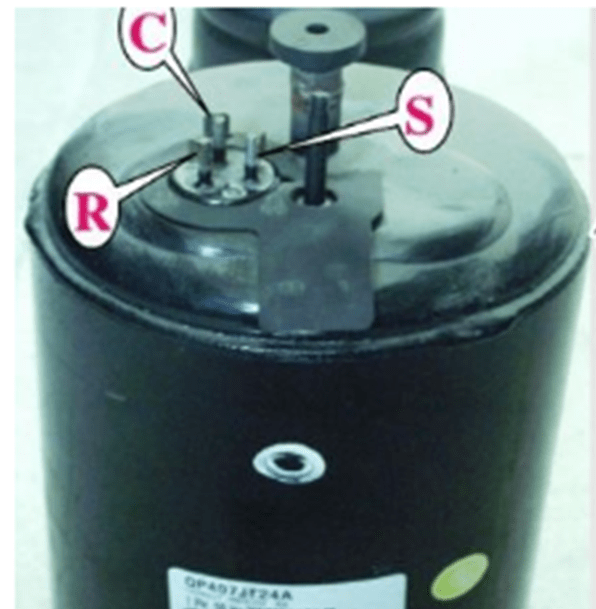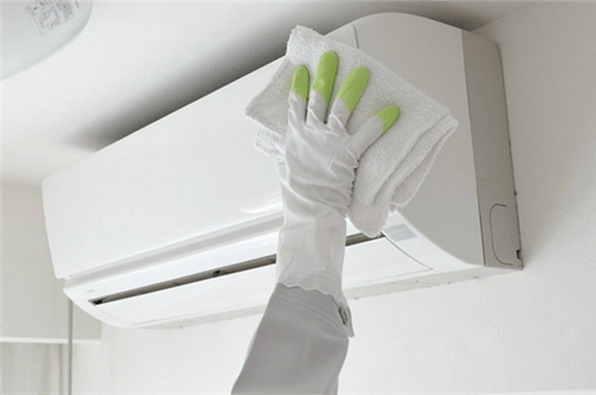
Figure 1: Air conditioner outdoor unit.
Air conditioning systems have several components that assist in the cooling of the air. These components are the compressor, condenser and evaporator. The air conditioning compressor is particularly critical in the air conditioning system, like the heart of the system, which has the function of compressing the refrigerant.
The air conditioner compressor is generally installed in the outdoor unit. When it is running, the compressor will suck the refrigerant from the low-pressure area, compress it, and send it to the high-pressure area for cooling and condensation. Through heat dissipation, the refrigerant will change from gaseous state to liquid state.
Afterwards, the refrigerant will flow from the high-pressure area to the low-pressure area, and be sent to the evaporator through the capillary tube, and the liquid refrigerant will become a gaseous state with the pressure dropping. This is how the AC compressor works over and over again to regulate the temperature.
The air conditioner compressor can be said to be the core part of the air conditioner. Once there is a problem, the air conditioner will not work normally. Therefore, we need to know what are the symptoms of a bad air conditioner compressor and how to check the failure of the air conditioner compressor.
The following is a list of some signs when the air conditioner compressor fails.
1. Symptoms of Bad AC Compressor
The air conditioner compressor plays a key role in the cooling of the air conditioner. If the compressor is broken, the air conditioner will stop cooling. If there is no sound when the outdoor unit of the air conditioner is turned on, it means that the compressor is most likely broken.
The following fault symptoms can also be used to determine if there is a problem with the air conditioner compressor.

Figure 2: AC compressor.
First, the compressor does not run after the power is turned on, and the protector operates. It is usually a shaft or cylinder failure caused by the refrigeration oil loss of the compressor or the intrusion of impurities.
Second, the system does not cool or the cooling effect is very poor. Usually it is the failure that air conditioner compressor suction and discharge valves do not close tightly.
Third, there is noise caused by the collision between the pipeline and the casing, the loosening of the fixing bolts of the compressor, and the falling off of the shock absorber. Fasten related parts.
Fourth, open circuit or lower operating temperature point. This problem is often easily confused with a slight short circuit of the winding. The difference is that the working current is normal when the thermal protector is damaged, while the current is too large when the winding is short circuited. It is usually caused by the damage of the AC compressor thermal protector.
Fifth, usually when the air conditioner compressor is short-circuited, open-circuited, and there is grounding fault between the winding and the casing, it is not easy to decide, and it should be determined according to the measured current.
Through the understanding of the fault signs of the AC compressor, we can directly determine some faults of the compressor, and avoid some tedious troubleshooting work, which not only saves time, but also helps to solve the problem quickly, so as to get twice the result with half the effort.
2. How to Check If the AC Compressor is Bad
You can easily determine whether the compressor is good or bad by doing the following:
1. Listening: usually the sound is a little loud when the normal compressor is started. If it is abnormal, the sound will be different.
2. Seeing: usually just to see if the line is broken. If the line is in good condition and the compressor does not start, it basically means that the compressor is bad.
3. Feeling: to feel whether there is cold air at the air outlet by touching, and whether there is vibration in the compressor. If it's not normal, it definitely feels different.
Do the above three points, and then combined with a multimeter to measure, it is easy to determine whether the air conditioning compressor is damaged.
Sometimes, the value measured with a multimeter is normal, but the internal short circuit of the compressor cannot be measured. The easiest way is to use a multimeter to check whether it is powered on. If it does not start after powered on, replace the old start capacitor with a new one (50UF). If it still does not start, then the compressor is broken.

Figure 3: Air conditioner capacitor.
2.1 How to Test the AC Compressor with a Multimeter
1. To determine whether the air conditioner compressor is good or not, first learn to identify the three terminals (S, R, and C) on the air conditioner compressor, where S is the start winding, R is the run winding, and C is the common terminal.
2. Then use a multimeter to measure its resistance value. When the resistance value between SC and RC is equal to that between RS, it is normal data. For example, the resistance between RC is 5 ohms, the resistance between SC is 3.5 ohms, then the resistance between RS is 8.5 ohms (a little deviation is allowed, but not too large).
3. If the resistance deviation is too large, or there is no resistance among the three, then the compressor is likely broken.

Figure 4: Three terminals of AC compressor.
3. How to Fix Air Conditioner Failure
The following are some common failures of air conditioners and methods to solve them.
1. Water leak of air conditioner
The water leakage of the air conditioner is generally an installation problem, or it may be that the drain pipe is blocked due to long-term non-cleaning. Therefore, when the air conditioner leaks, it is best to reinstall the air conditioner, and you can also clean the air conditioner and dredge the drainage pipes.
2. Air conditioner noise
Generally, after the air conditioner has been used for a long time, the noise of the outdoor unit will become very loud, which often affects the user's rest. The noise of the air conditioner is usually caused by the unfixed installation, which causes noise due to vibration when the air conditioner is started, so the installation position of the air conditioner should be firm.
3. Weird smell of air conditioner
The odor of the air conditioner is mainly caused by the air conditioner evaporator not being cleaned for a long time. Being in such an environment for a long time will affect the health of the user. If the air conditioner has a peculiar smell, you can spray a special disinfectant for the air conditioner on the evaporator, and then wash it with clean water.
4. Poor cooling effect of air conditioner
The problem of poor cooling effect of the air conditioner may be caused by the lack of refrigerant, or too many stains on the air conditioner, or the installation of the outdoor unit. You can ask professional maintenance personnel to check.
4. Tips for Air Conditioner Use

Figure 5: Clean air conditioner.
1. Set the proper temperature
When using the air conditioner, do not adjust the temperature too low. Usually, the air conditioner should be set at 26-27 degrees in summer. The lower the temperature of the air conditioner, the greater the power consumption.
2. The power of air conditioners adapts to the room size
When purchasing an air conditioner, the power of air conditioners should be suitable for the size of the room. For example, choose 1hp air conditioner within 10m², 1.5hp for 10-18m², and 2-3hp air conditioner for 18m².
Of course, it can also be considered according to the actual situation. If your room is a sunny room with a higher temperature, you can also choose an air conditioner with a larger hp.
3. Choose the appropriate air outlet angle
When using the air conditioner, choose a suitable air outlet angle. For example, in summer, the cold air will go down, so the air outlet should face upwards for better cooling effect.
4. Ventilate in advance and open doors and windows less
When using the air conditioner, the indoor air should be ventilated in advance to ensure that the air is fresh. During use, pay attention to ventilation, and do not keep the doors and windows closed for a long time, otherwise the air will not circulate, which will affect the indoor air quality and is not conducive to the health of users.
5. Maintenance of air conditioners
The air conditioner also needs frequent cleaning. The dust on the filter inside the air conditioner needs to be cleaned frequently, which can improve the cooling efficiency of the air conditioner.
Related Info
Why is My Central AC Running but Not Blowing Air?Why is My AC Not Cooling? (Detailed Reasons and Solutions)
How an AC Compressor Works and Its Common Types (with Pictures)
How to Fix an AC Compressor?
What is an AC Compressor? Everything You Need to Know


